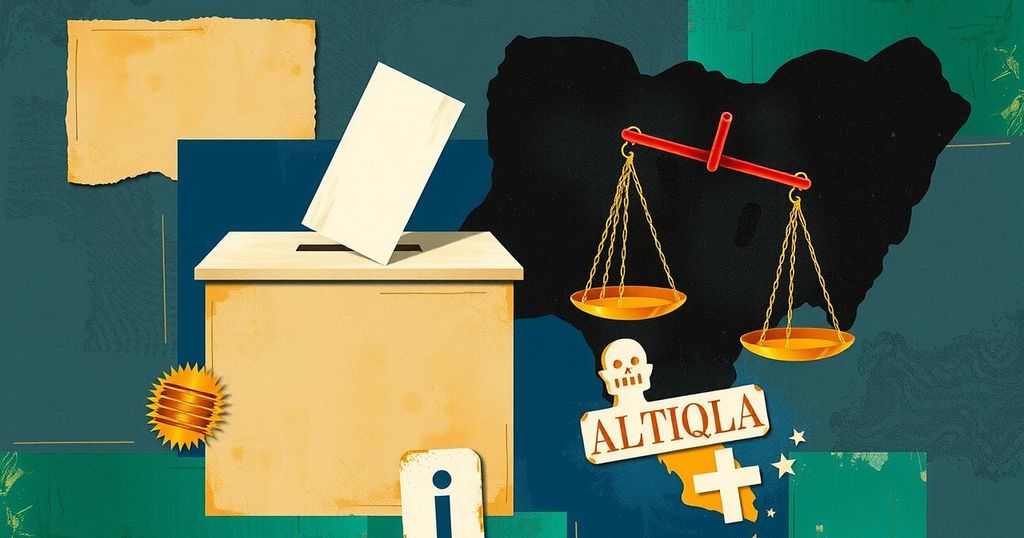Compulsory Voting and the Crisis of Democracy in Nigeria

Nigeria’s proposed Compulsory Voting Bill aims to penalize non-voters, igniting widespread condemnation as critics highlight the misaligned focus of lawmakers. Rather than addressing election rigging and fraud—issues that erode faith in electoral integrity—lawmakers seem more intent on enforcing participation through punitive measures. This reveals an alarming disconnect in the political system, where the real culprits evade justice while ordinary citizens face harsh consequences. True democracy requires reform, transparency, and accountability to rebuild trust and encourage civic engagement among citizens.
In Nigeria, the phrase “Nigeria can happen to anybody” has taken a grim turn with the introduction of the Compulsory Voting Bill. This initiative, which is widely criticized as draconian, brings attention to the bizarre notion of penalizing non-voters with jail time while allowing those who manipulate elections to roam free. Instead of tackling the rampant electoral fraud that plagues the system, lawmakers are focusing on forcing citizens to the polls, further highlighting the disconnect between the political elite and everyday Nigerians.
The proposed bill seems to be a misguided approach to a serious problem while ignoring the larger issues at play. Many citizens feel that punishing non-voters only serves to underscore the inequities of a system where riggers and corrupt officials are rarely held accountable. Instead, true democracy calls for addressing electoral misconduct and establishing a more just political environment.
In Nigeria’s current climate, where incidents of election rigging and voter suppression are rampant, it appears hollow to criminalize those who choose to abstain from voting. The frustration among citizens is understandable given that even those who participate often face obstacles like election violence or late-arriving materials. It is unjust to place blame solely on the disillusioned, when in fact, systemic failures have led many to lose faith in the electoral process.
Moreover, imposing compulsory voting elicits a feeling of coercion rather than encouraging civic engagement. Though voting is indeed a civic responsibility, the relationship between citizens and their government should be founded on trust and respect, not on threats of punishment. Rather than inspiring patriotism through forced participation, the government should aim for transparency and accountability within the electoral system to restore faith to its citizens.
Meanwhile, the actual culprits in Nigeria’s election woes—the riggers, the ballot box snatchers, the vote buyers—continue to evade justice unscathed. These individuals undermine the very fabric of democracy, yet they remain outside the reach of legal consequence, while ordinary citizens who opt out of a flawed system potentially face imprisonment. This disparity reflects a troubling reality in which the powerful evade accountability while the marginalized face harsh penalties.
During Nigeria’s last general elections, reports of electoral fraud, vote-buying, and intimidation filled the air. Footage showed agents distributing cash for votes, while thugs attacked polling stations. So, one must ask: how many of those who actively disrupt the democratic process faced genuine repercussions? Almost none. It raises serious questions about the fairness of any punitive measures against citizens who simply choose not to vote under such hostile conditions.
The mismatch between punitive proposals and the need for genuine electoral reform illustrates an alarming trend. Politicians push the narrative of civic duty while conveniently overlooking their roles in eroding public trust. The duplicity is hard to ignore; it is almost cruel to punish those who have lost faith in a system that seems determined to fail them.
This systemic hypocrisy reflects larger societal issues. The judiciary remains weak, law enforcement is often selective, and the legislature is filled with individuals who thrive amidst disorder. Thus, while ordinary citizens can find themselves penalized for inaction, the elite escape unscathed, perpetuating cycles of injustice and reinforcing deep-seated public mistrust.
The painful reality is that Nigeria is caught in a trap of institutionalized injustice, leaving many citizens feeling hopeless. The solution, however, lies in reform rather than repression. To boost voter turnout and re-engage the populace, government strategies must focus on creating a transparent and fair electoral process. Giving citizens a reason to believe their vote counts is essential to restoring democracy’s integrity.
Ultimately, democracy is not only about votes cast; it is about the faith that accompanies those votes. If the government wishes to see a more active electorate, it must first protect that faith rather than imprison those who feel let down. To quote the wise counsel of democracy, it will not flourish under the weight of coercion but will thrive only when citizens see their voices make a difference. Until then, punishing non-voters while allowing election fraudsters to thrive will remain one of the profound contradictions of Nigeria’s democratic aspirations.
Without significant change, the political landscape will continue to marginalize authentic participation, and Nigerians may find themselves trapped in a cycle of disillusionment and injustice. It is urgent for the nation to move past these issues and build a genuinely fair and accountable electoral system. Only then can it stop “happening” to the citizens in the most disheartening ways.
The proposed Compulsory Voting Bill in Nigeria reveals a troubling disconnect between lawmakers and the citizens they are meant to serve. Legislation that criminalizes non-voters while ignoring the real threats to electoral integrity—riggers and election manipulators—highlights a systemic failure to address the root causes of voter apathy. A move towards enforced participation may undermine rather than enhance democracy, emphasizing the imperative for reforms that restore trust and sincerity in governance. Without this, any attempts at fostering civic engagement will be futile at best.
Original Source: thesouthernexaminer.com








